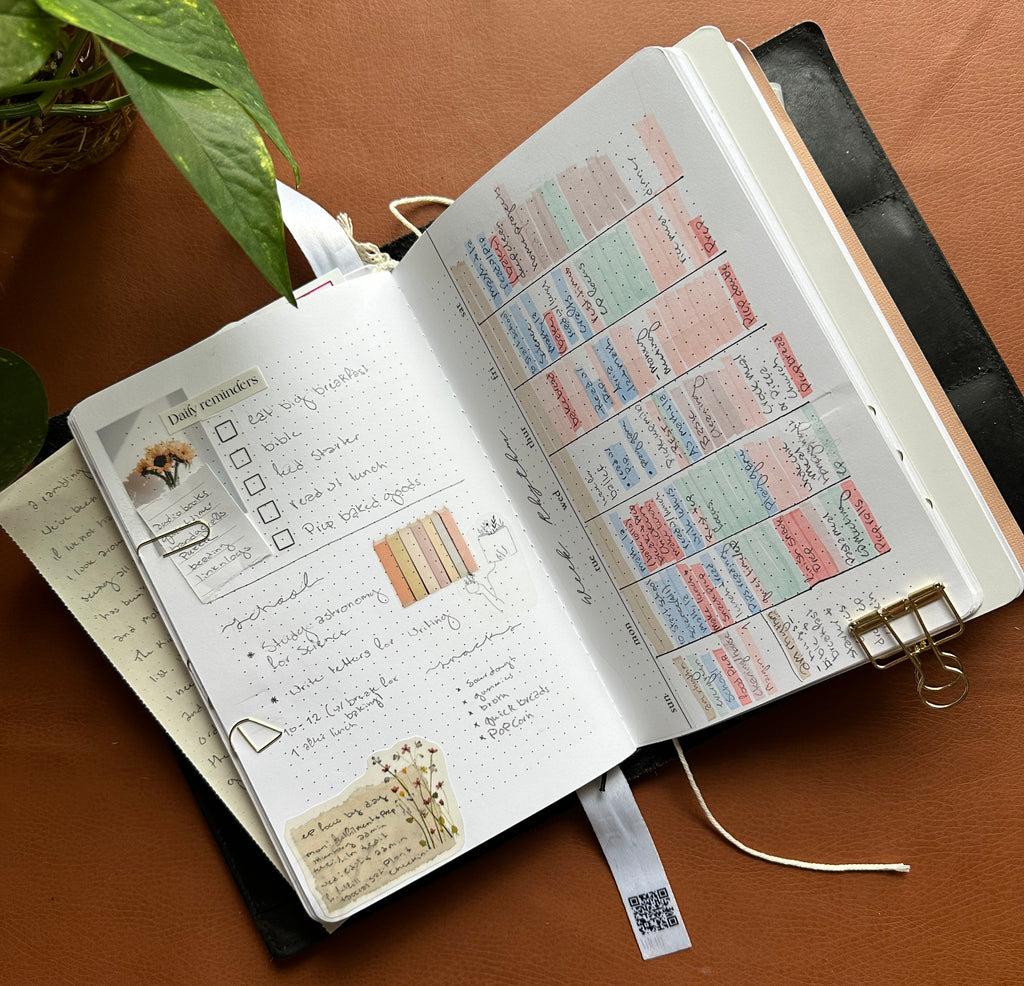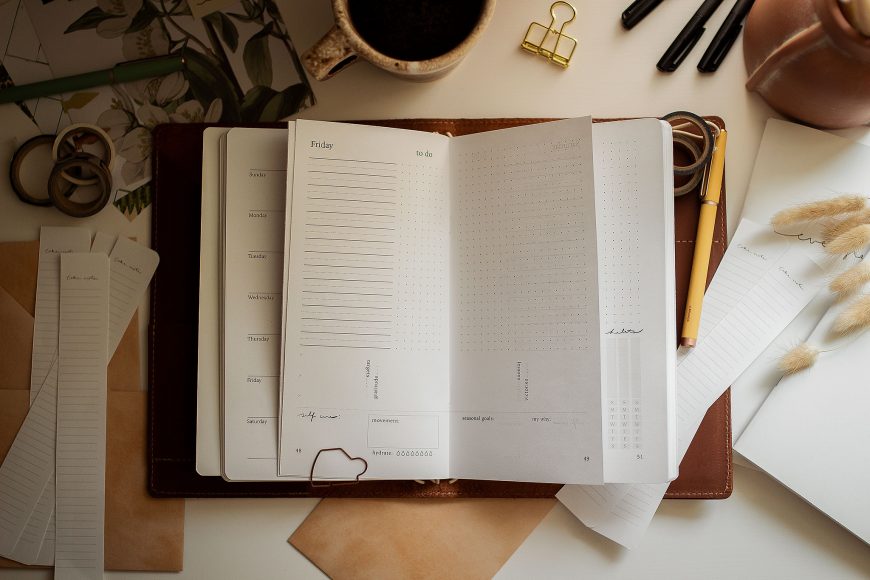the Blog

McCauley's Week Rhythms
Recently, I (McCauley) have been doing the hard work of shifting my rhythms. Seasons are changing, and I've felt scattered because of how much time I was allowing for overlap between focused time with my kids and time that needed to be set aside for business tasks.
I know that the best way for me to get business work done later in the day is to make sure I connect with my kids in the morning. Whether it's working together through school, doing a craft, or going outside, I know I have to tend to my children first to help them feel grounded. This also helps them know what they need to do for the rest of the day.
So when I started tweaking my week rhythms, I knew it was important to not allow overlap between my focused time with my kids, and business work.

Planning While Postpartum - Podcast Episode 7
Planning while postpartum? At first glance it sounds over-the-top, almost an oxymoron. In the past we've even written about how the postpartum season can be an excellent time to take a break from your planner. So why did we choose to do an entire podcast episode on planning while postpartum?
You have to remember that when we say "planning", we are talking about self-compassionate planning. And perhaps there is not a better time to practice self-compassion than when you are in a season of recovery like the postpartum season. When we say planning while postpartum, we aren't talking about planning our biggest goals, or mapping our business' trajectory for the next year; we are talking about the simple, but extremely useful, form of day-to-day planning that helps us get out of our heads, sort our priorities, and let the non-essentials fall away.

Self-Compassionate Planning + We're Launching Our Podcast!
Planning, Pressure & Shame
When we launched our business in 2019, something caught us off guard. After years of field-testing different prototypes with ourselves and friends, we finally had our planner system on the market. The planner had become an indispensable part of our own lives, and we wanted to get it into the hands of others. Orders poured in and we were thrilled to see how other women would use this tool to fuel their goals.
But then we started getting emails and messages from women wanting to know how we thought they should spend their time. They weren't just wondering whether they were doing this planning thing right—they were wondering if they needed to overhaul their entire lives in order to justify having bought a planner in the first place. These women were feeling both pressure to make perfect plans and shame when their days turned out differently than they imagined. Some were even feeling weighed down by the perception that their planner should look beautiful, even in the midst of their planning.


Now, don't get us wrong, we're down for an artful planner spread any day. And we believe there is so much to be learned from the planning community–hacks, tricks, best practices, etc. But we don't believe that intentional living—and planning as a means to form an intentional life—has to be laden with pressure and shame. We believe quite the opposite.
Using a planner is not about super-womaning our way to an awesome life, or about forcing those around us to bend their lives to make our dreams happen. It's not always about making a lot of money, or reaching an impressive personal goal, or cramming our life as full as it possibly can be. It's not about making inflexible plans that don't adapt as we go.
But we also know that giving up all of our power to be proactive is a sure path to overwhelm. We believe planning is about forming a rhythm that leads to a lifestyle that fuels realistic and life-giving goals, so that those goals can in turn breathe life into your rhythms. We've found this is only possible if you take a self-compassionate approach to planning.
What is self-compassionate planning? It is making the best plans you can—consistently over a lot of days—and yet having grace on yourself as you go, knowing that plans do change and that flexibility is key.
Friend, we don't know your biggest dreams, your biggest pain points, or the goals you've set for yourself this year. But we're excited to put the Evergreen Planner in your hands as a tool that you use to reach those goals.
And as for a self-compassionate mindset?
Well, we've got something for that too.
Our Podcast
We're passionate about helping women craft intentional lifestyles that empower them to achieve their most life-giving goals. When our team gets together to support each other, we end up having these amazing conversations that encourage each of us to stay focused on the things that matter most.
So we decided to throw up some mics so we could share our conversations with you.
On October 4th, 2021 (that's this Monday!), we're launching our podcast: Make Space to Thrive.

Our first season will run for eight episodes, and will be available on all the major platforms.
We'll be talking about our four rules of planning, taking a deep dive into our R.O.O.T.E.D. goals system, discussing planning while postpartum, how we plan our days & weeks and so much more. We're so excited to share all we have learned and are learning with you all. But more than anything, we're excited about taking some of the pressure off, and bringing encouragement to the wonderful women we have met since launching our business. This podcast is for each of you, from our hearts.
xx,
Team Evergreen

Using Prompts Effectively: Self Care, Movement, Seasonal Goals & My Why
Last week, we looked at the first four prompts located on the day spread of our Classic booklet. If you missed that post, it's worth a read, but here's a quick recap of the "why" behind these prompts:
We built these prompts around the best habit practices productivity gurus regularly write about, and we've seen huge benefits from using these prompts daily. When something feels off in our planning rhythm, it's often because we've let the habit of using these prompts slide. Using these prompts again and again and again and again each day will build initially small, but long-lasting habits around creating targets and goals, reflecting on your days, and pivoting where needed.
Today we're going to look at the final four: Self Care, Movement, Seasonal Goals & My Why.

Using Prompts Effectively: Targets, Gratitude, Lessons & Victories
You know at your core that developing strong habits can change your life. It's a beautiful vision. But actually re-crafting your lifestyle around your most life-giving priorities takes more effort than just knowing it's a good idea. We created our planner to deeply and consistently support you in this work.
We invested years of research into the development of a network of powerful prompts that have been proven to result in more intuitive and confident choices, a more effective approach to productivity, and a stronger growth mindset. We distilled them down to the essentials so that they could fit seamlessly into a healthy morning (or evening) rhythm. And we personally field-tested them for years. We have been reaping so many benefits from having organized minds and putting our personal growth cues on autopilot, and we are thrilled to get this game-changing system into the your hands.
Our planner has eight effective prompts, and in this post we are going to look at the first four: Targets, Gratitude, Lessons & Victories.

Taking a Break From Your Planner
Your planner is a hub for your brain.
But is there ever a right time to take a break from your planner?
From the hearts of three fellow busy women, let us offer you some solace with a resounding YES.
The planner is absolutely incredible for charting out rhythms, decluttering your mind, storing tasks and reminders, housing the flexible structures you want to build into your days, providing real-life context for your goals and plans, and helping you get laser-focused on the things that matter most in just minutes.
But sometimes life happens in such a way that trying to dive into our planners feels heavy, out-of-context, or forced.

How to Stop Wasting Time on Screens
Last week, we asked this question:
What are the most overwhelming areas of my life? If I were proactive in these areas (instead of operating in a default, reactionary state), how could I clear the excess and focus on what matters most?
In this post, we're going to get really practical and tactical.
Understanding the (Designed) Problem
I used to think my life was overwhelming by default, and that I simply didn't have enough time and mental energy to do everything I believed I was called to do. I didn't sit around and watch TV, and I'd even turned all of the notifications off on my phone, but I still found the days to be far too short.

How to Stop Wasting Time by Taking a Second to THINK
Last week, we wrote about the importance of having the proper perspective when it comes to valuing time. If you haven't had a chance, it's worth reading right now.
For many of us, time-wasting doesn't look like one would expect. We're not laying around on the couch all day every day, eating Cheetos and watching reruns. We're actually really busy—always going, doing, hustling, and racing from one thing to the other. That's how we feel, anyway, and the result all too often does look like Cheetos-and-reruns-on-the-couch for a lot longer than we think is healthy, because we feel too worn out to do anything else with our pockets of free time.
It's the typical song and dance of our busy culture.
But what if a large amount of our busy-ness itself is the drain on our time?

How to Stop Wasting Time: Perspective
Stop for just a second and ask yourself: what is a week of your life actually worth?
We only have 4,452 weeks from the moment we're born until our 85th birthday (if we're given that many years).
Just...let that sink in. We have fewer than 5k weeks in an entire (generous) lifespan, and yet, sometimes we just let a "bad" or "off" week (or several) slip away without seriously evaluating underlying causes and lessons we could be learning.
Now, don't misunderstand: sometimes a week that's way more heavy on rest, fun, or flexibility is needed. Sometimes, crises (internal and external) endow a week with a heavenly purpose that we cannot immediately grasp from our point of view in the moment.

How to Get Back Up Again
"Uh oh, Elizabeth, be careful. You're sloshing it out."
My four year old stops her stirring for a second, processing my words. She sees where a small puddle of batter is now splatted on the counter top. She adjusts her grip, and then begins to mix again, slower this time.
"It's okay, Mom." She says in a confident tone. Then under her breath, more to herself than to me, "It's all a part of learning."
I'm pretty sure she got that phrase from Mister Rogers' Neighborhood, and I'm completely in love with it.

Understanding Social Energy & Communication Styles
Last week, we wrote about productivity personalities, how to feed strengths and compensate for weaknesses, and how these ideas have played out in our Evergreen Team dynamics. In this post, we're going to look at social energy and communication styles, and the ways doing all this work around who you are and who you're working with can help you work more compassionately and productively as an individual and on a team.
Social Energy
Way more popular than productivity personalities, is diving into the concept of being "introverted" vs "extroverted."

Where do you even start when you've found yourself in a 'survival mode' season?
You start right where you are.
- You embrace the realities of your context.
- You set (and KEEP!) a daily strategy and reflection meeting with yourself.
- You purge unrealistic expectations.
- You get serious about facing the deeper problems.
- You carve out time for adequate sleep and rest (you can’t solve problems or show up well for your relationships if you don’t get enough sleep!)
- You develop rhythms for your basic responsibilities.
- You clear focus time for the important things that keep being pushed to the back burner.
- You adopt a growth mindset.
- 1
- 2


